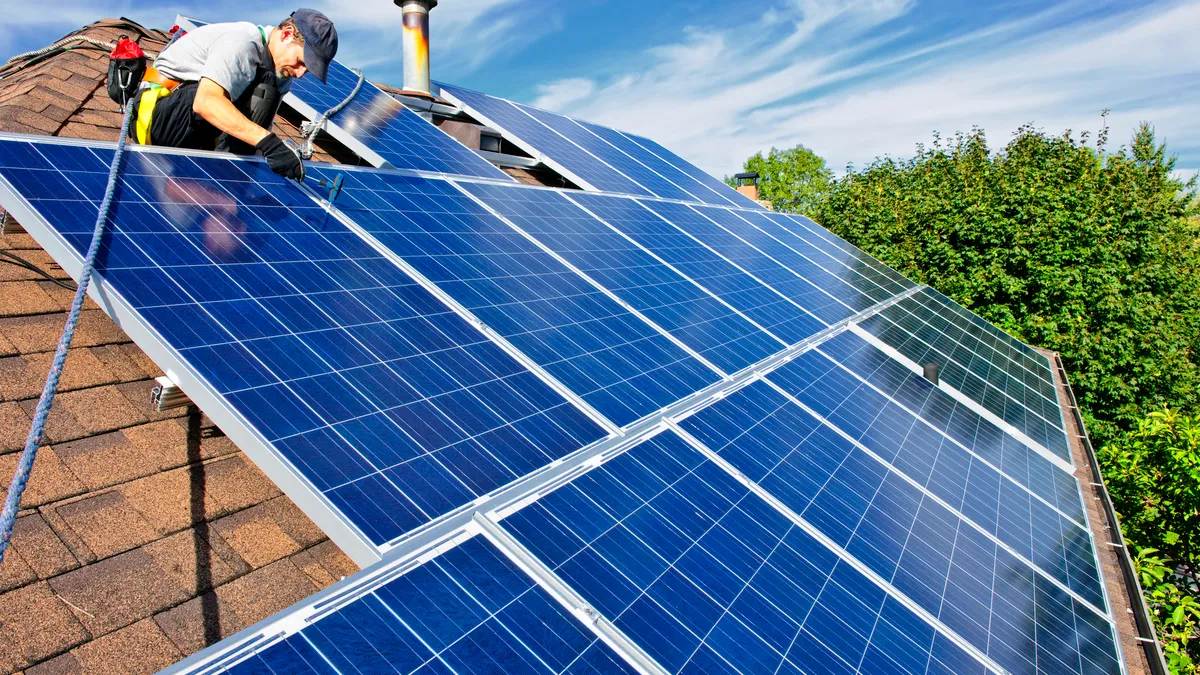Dive Brief:
- A pair of laws passed by the North Carolina legislature in 2017 and 2021 set an end date for net metering, which pays rooftop solar users for electricity they don’t need and send back to the grid. Seeking to preserve incentives for solar use, a group of stakeholders that included environmental groups, industry associations and Duke Energy worked out an agreement that was presented to the North Carolina Utilities Commission.
- The North Carolina Utilities Commission accepted a section of the deal involving net metering, replacing a credit worth between 9 and 13 cents per kilowatt hour with a variable payment rate that changes based on overall electricity demand on the grid.
- The commission rejected a proposed incentive program that would have paid solar users who install a smart thermostat that lets Duke adjust household temperatures by a few degrees in times of peak demand to reduce energy consumption and prevent a grid failure.
Dive Insight:
Environmentalists, industry groups and energy providers in North Carolina are happy that the state’s utilities commission preserved net metering for rooftop solar users, especially with so many other states going in the opposite direction.
The decision handed down by the commission on March 23 seemed to satisfy most parties involved, even if no one was entirely happy with it.
“It's a pretty contentious issue and it felt good that we got an agreement,” said Duke spokesperson Randy Wheeless. “We thought it was a very constructive ruling. I think we're very pleased with it.”
The utilities commission agreed to replace an existing net metering credit with a variable rate. However, the commission rejected a rebate program that would offset some of the initial costs to install rooftop solar, instead asking the parties involved to develop an incentive program involving battery storage.
“This is part way there, maybe more than half, and on balance we think it's a good thing,” said Nick Jimenez, a senior attorney with the Southern Environmental Law Center.
But some groups involved in the negotiation were disheartened by the split decision.
“It’s very disappointing in my opinion, and not what we as a group came up with,” said Jake Duncan, southeast regulatory director for Vote Solar. Duncan had hoped net metering would work in concert with the smart thermostat incentive program to encourage more households to install solar panels.
The order comes just months after California slashed net metering rates by 75%, in a move that environmentalists and solar industry representatives said would discourage Californians from installing solar panels.
States like Nevada and Arizona have made similar moves, and some environmentalists along with solar industry representatives consider North Carolina’s decision a better alternative and a model other states can follow.
North Carolina’s agreement also prevents future clashes between utilities and environmentalists, stakeholders said.
More than 36,000 customers took advantage of net metering in North Carolina last year, up from from roughly 900 in 2013, according to figures provided by the North Carolina Sustainable Energy Association.
It’s not clear if rooftop solar users will make more or less money under a variable rate for net metering. The utilities commission tasked Duke Energy with creating a bill calculator to help customers better understand net metering’s benefits.
Duke Energy, for its part, is satisfied with the move because the company can pay customers at a lower rate when it doesn’t need extra power.
Under the old system “the utility might be paying a full retail rate for electricity at a time or day or season when we didn't need it,” Wheeless said.
But environmentalists and industry groups had hoped the commission would give North Carolinians a greater financial incentive to install rooftop solar panels. They proposed tying those incentives with the installation of a smart thermostat that Duke Energy could adjust in times of peak demand. The commission instead asked the stakeholders to develop an incentive tying rooftop solar panels with battery storage.
Negotiators wanted to develop an incentive involving battery storage eventually, and the commission effectively asked them to skip the smart thermostat step, said Lon Huber, senior vice president of pricing and customer solutions for Duke Energy.
The utilities commission provided a framework for a battery incentive and gave the stakeholders 90 days to work out the specifics.
While Huber stressed the commission’s decision is a “good first step,” he said smart thermostats are simpler to install.
“A smart thermostat is an easier sell than installing a battery system,” he said. “There’s a lot more electrical work” involved in installing batteries.
The commission said the battery incentive should be worth 36 cents per watt, but incentives are capped at 20 MW and are only available to customers installing battery storage and solar panels for the first time, Duncan noted, limiting the number of people who can participate.
“I think the pilot is going to be a lot less accessible to the wider potential rooftop solar marketplace,” he said.
Other groups were happy that the utilities commission approved some kind of incentive for North Carolinians considering solar panels.
“There is potential to get the upfront storage incentive right and reach a broad swath of solar adopters,” said Taylor Jones, senior regulatory counsel for the North Carolina Sustainable Energy Association. “It creates an opportunity instead of closing the door on an upfront rebate for solar.”
A representative of the utilities commission declined to comment on the record, instead referring to the commission’s March 23 order














